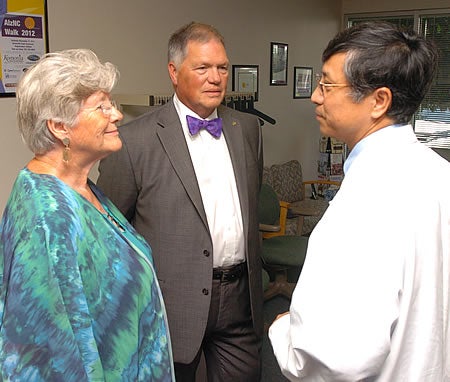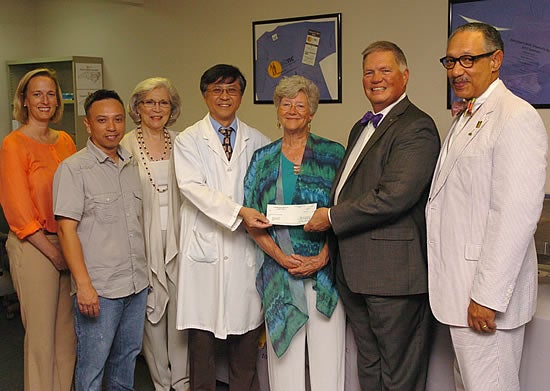ECU Alzheimer’s lab receives grant
GREENVILLE, N.C. (Aug. 12, 2013) — An East Carolina University laboratory dedicated to research on dementia has received $50,000 to advance studies of Alzheimer’s disease.
The money will be used to study the effects of physical and cognitive exercise on laboratory animals with symptoms of dementia and how certain drugs can mimic the effects.

From left, donor and AlzNC board member Laura Gaddis, AlzNC board chair J. Gregory Wallace and Dr. Qun Lu of ECU talk at Friday’s check presentation. Photos by Doug Boyd
“Exercise has long been known to improve people’s general health,” said Dr. Qun Lu, a scientist and professor of anatomy and cell biology at the Brody School of Medicine at ECU. Lu wants to see if that improvement can help dementia.
Lu is director of the Harriet and John Wooten Laboratory for Alzheimer’s and Neurodegenerative Diseases Research at ECU. The grant is the first to be awarded to the lab itself rather than to individual researchers.
“It’s a milestone that we can do more now,” Lu said of the grant’s importance to the lab. “We have a tremendous amount of potential. We can do a lot of things together.”
Working with Lu are Dr. Sonja Bareiss, an assistant professor of physical therapy in the ECU College of Allied Health Sciences; and Dr. Tuan Tran, an associate professor of psychology at ECU.
The grant was presented Friday at an event at the Alzheimers North Carolina Greenville Program office on Stantonsburg Road. AlzNC donated the money.
Laura Gaddis owns the Guardian Angel thrift stores in Fuquay-Varina and Apex and is an AlzNC board member. Since she opened her first store in 1999, she has donated $1.6 million to Alzheimer’s research and respite care in North Carolina.
“My mother had Alzheimer’s, and I started a thrift to raise funds,” she said. “It’s been like a 747 taking off. The community has been very supportive.”
More than 140,000 people in North Carolina have Alzheimer’s disease, according to Alzheimers North Carolina, and that number is expected to quadruple by 2025.
Earlier this year, Lu and colleagues published research that could help lead to a better understanding of how individual cells perform certain tasks and could have implications for Alzheimer’s disease and other conditions.
Lu’s research was published in the January issue of The Proceedings of the National Academy of Sciences of the United States of America. An abstract of the study, titled “Small Molecule Targeting Cdc42-Intersectin Interaction Disrupts Golgi Organization and Suppresses Cell Motility,” is available online at http://www.ncbi.nlm.nih.gov/pubmed/23284167.
The Wooten Laboratory was established in 2008 by Dr. Harriet Wooten in memory of her husband, Dr. John Wooten, an orthopedic surgeon who died of Alzheimer’s disease in 2004. More information about the Wooten Lab is online at http://www.ecu.edu/cs-dhs/wootenlab.
The Alzheimers North Carolina 2013 Greenville Walk will be Nov. 2 at the Greenville Town Common. More information is available online at http://www.alznc.org or by calling at 252-355-0054.

From left, Dr. Sonja Bareiss and Dr. Tuan Tran of ECU, Alice Watkins of AlzNC, Dr. Qun Lu of ECU, donor and AlzNC board member Laura Gaddis, AlzNC board chair J. Gregory Wallace and Dr. Paul Cunningham, dean of the Brody School of Medicine at ECU, were among those at Friday’s check presentation.